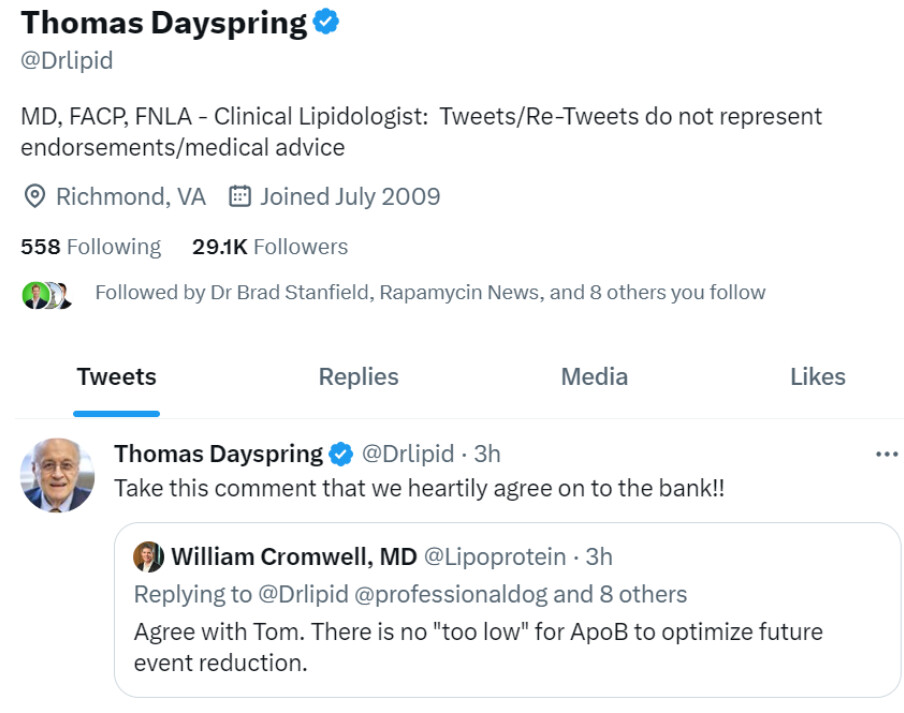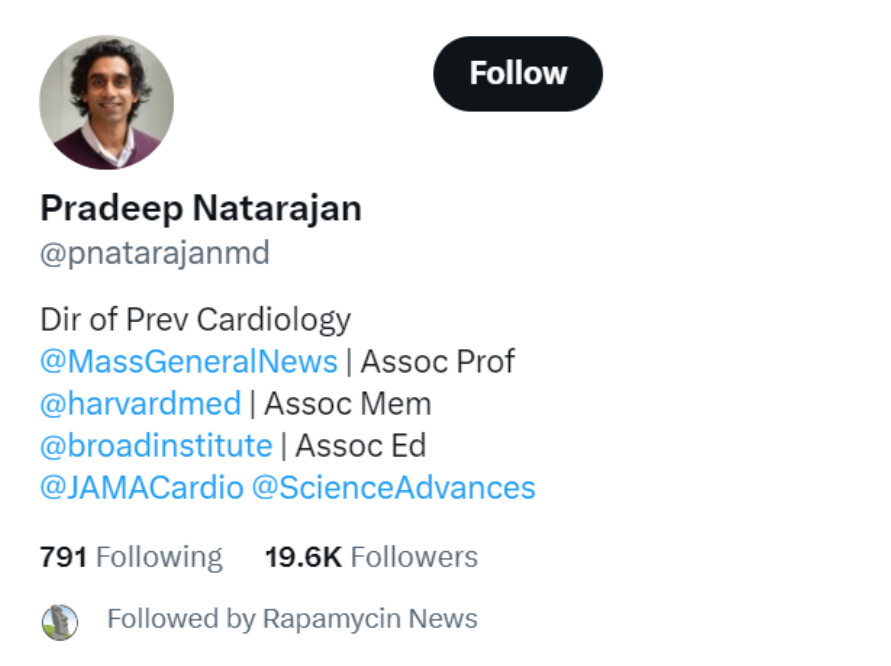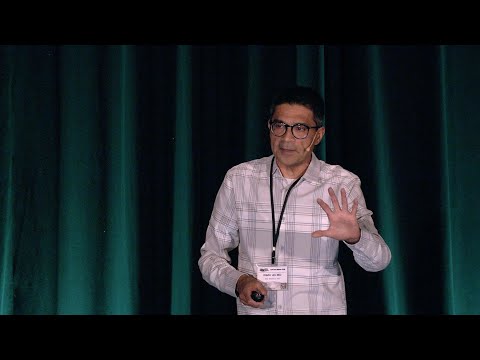I said randomized controlled trials and mendelian randomization. The former in short term PCSK9i and statin studies lowering to very low levels, and the latter for the long term.
What are you talking about? What RCT in short term PCSK91 and statin studies showed lowering LDL to very low levels improved health outcomes? In what population?
It is just not helpful to invent research studies that have never been done and then start claiming they show something.
You can extrapolate from the work that has been done, and form an opinion about what might happen in a different population, or if treatment was to a lower LDL or ApoB level, but that is an inference you are drawing, and should not be presented as an ‘established in randomized controlled trials … causal relationship.’
There are randomized controlled trials showing events decreasing from an already low LDL cholesterol down to minimum levels. In statins and PCSK9 inhibitors.
Statins:
PCSK9 inhibitor:
Evolocumab and Clinical Outcomes in Patients with Cardiovascular Disease
https://www.nejm.org/doi/full/10.1056/nejmoa1615664
Irrelevant as the results is completely consistent with all the mendelian randomization data and other trials. Namely that decreasing LDL/apoB via drugs or genetically decreases heart disease. It isn’t surprising it happens in lower LDL’s as well.
The first link is an opinion piece, not a RCT.
The second link is an RCT that deals with secondary prevention, not primary. It demonstrates that, for people with high enough risk factors such that they are already on a statin - note that 80% of them previously have had a heart attack, 19% previously have had a stroke at the beginning of the trial - have a modest benefit from adding a PCSK9 inhibitor.
The reduction of death from any cause was not even statistically significant in this high risk population. They actually had slightly more cardiovascular deaths in the treatment group, although the difference was not anywhere close to statistical significance. Anyway, a pretty modest result.
Whether the result is due to lowering LDL or something else is not something this study design can prove. All it can show is that this particular drug provided a very modest benefit - as defined by an odd composite endpoint - in a patient population with cardiovascular disease.
Just as a trial showing a benefit of injecting insulin of a certain type in type 1 diabetics would not demonstrate that injecting insulin was helpful in non-diabetics, this study does not demonstrate the average person would benefit from a PCSK9 inhibitor. They may, or they may not. The study is silent on that question, by design.
Now you may extrapolate and decide it is obvious and that is fine too. You are entitled to your opinion, of course. And you may even be correct; I’ll not argue otherwise. What you should NOT do is mislead others by claiming it has been causally proven by RCTs.
There is the link.

It’s from the LDL lowering.
Absence of evidence isn’t evidence of absence.
So it’s magically something else and not the massive LDL lowering despite the massive amount of evidence of the effect of LDL lowering. The drug target is also from genetic studies of massive reductions in heart attack risk from PCSK9 mutations. PCSK9 inhibitors came from genetic studies with a clear exclusion of confounders as the mechanism is well studied.
So then you would not take a lifespan increasing drug that was studied in very old people - as they have the highest mortality risk?
I’m just going to agree to disagree with this one.
Since the causal inference (internal validity) is good, the generalizability (external validity) is so as well, it is not called ‘extrapolating’. Do you think the causal inference is bad, or are you just being a skeptic for the sake of being a skeptic? Where do you draw the line? Do you not take any drug that hasn’t been studied in a clone army of yourself? As your personal genetics, gut microbiome, etc, surely plays a factor as well.
Why do you take rapamycin, why do you think you can generalize that result to humans, or yourself? It is even worse since its based on animal studies.
I linked RCT’s in humans, that also is consistent with other RCT’s with other conditions, health status when it comes to the causal inference between LDL and events.
There are just too many cardiologists that say you need to have a low LDL and ApoB to ignore.
If people want to believe otherwise so be it.
I take rapamycin but refuse to ignore increases in lipid levels and I treat them accordingly
Everybody is different, I guess. Though anecdotal, the best evidence i can provide is my own experience, 57 never been to a doctor and feel same as when I was in my 20’s. Btw I do splurge on anything i like at times, but eat mainly proteins (steak my preferred) and fat, mostly organic. And no I’m not a medical practitioner. Considering that most you guys have ailments in one form or the other, and I have none (including I never get colds, or flu) then I must be doing things right, don’t you things so?
A total of 181 RCTs with 220 treatment arms (14,505 participants: 7348 cases and 7157 controls) were included. There was a significant reduction in LDL cholesterol (MD: −8.28 mg/dL, 95% CI: −11.38, −5.18), total cholesterol (TC) (MD: −10.82 mg/dL, 95% CI: −12.98, −8.67), TGs (MD: −5.55 mg/dL, 95% CI: −10.31, −0.79), and apolipoprotein B (Apo-B) (MD: −44.99 mg/L, 95% CI: −62.87, −27.12) after soluble fiber supplementation in the overall analysis. Each 5 g/d increase in soluble fiber supplementation had a significant reduction in TC (MD: −6.11 mg/dL, 95% CI: −7.61, −4.61) and LDL cholesterol (MD: −5.57 mg/dl, 95% CI: −7.44, −3.69). In a large meta-analysis of RCTs, results suggest that soluble fiber supplementation could contribute to the management of dyslipidemia and the reduction of cardiovascular disease risk.
HT Lustgarten
well if rapa increases bad cholesterol, as some are saying why would anyone do rapa. There has been so many substances that supposedly increased life span in mice and fruit flies etc… but none have been proven to be effective in humans, at least up to now. Rapa i thing is the same, just a fad like resveratrol etc…For me i have gotten best results (anecdotal of course) from the following:
Fasting- three-five days every couple months, dry fasting is best if you can, if not drinking water is ok
VitC and L-lysine- for colds and cardivascular help, have a family history of heart problems, i hav been just fine
Niacin- the flushing time is one of the best supplements out there for many ailments especially joint and muscle pain
Niacinamide- great for skin and hair and to protect against sun exposure
Wild cod liver oil- Good for brain energy and heart
Heavy exercise, but only 15 minutes per day, very good in tricking your brain to signal the right hormones, i.e. helping stay agile and healthy.
_used to do vit d3 but stopped because it was giving muscle cramps, which i read it to mean it is depleted micronutrients in the muscle
that is it for now, and i mainly eat proteins and only eat 1-2 big meals per day, try to stay organic ,ost of time
Can you provide some bit more color on this?
Maybe this study can give some color on that. It is in no regard a definite proof, but it is opening perspective that short burst of exercise might be better for longevity than MICT…
It also makes sense from evolution perspective, people, hunter gatherers, were moving slowly, hunting or gathering plants. This is like walking, stretching, yoga poses ![]() and then suddenly you are in danger by some random animal and you need to give your best to escape or you must give your best to run to catch it…
and then suddenly you are in danger by some random animal and you need to give your best to escape or you must give your best to run to catch it… ![]()
Surprising that decrease in apoB is almost 2 standard deviations but LDL is quite weak.
Anyone know any soluble fiber sources/supplements that’s good?
Psyllium husks? Metamucil? Inulin?
Crap study, IMO, because the control group was also exercising. So we are probably comparing healthy people to healthy people and the result was not statistically different.
I am still alive and well at 82. My current exercise program consists of weight training followed by a sprint on a rowing machine that gets my heart rate up close to maximum.
“All cause mortality did not differ between the control group and combined MICT and HIIT group”
“This study suggests that combined MICT and HIIT has no effect on all cause mortality compared with recommended physical activity levels. However, we observed a lower all cause mortality trend after HIIT compared with controls and MICT.”
This study had a plethora ![]() of responses and critical analyses by other PhDs and MDs. If you are so inclined here is a reference for the responses.
of responses and critical analyses by other PhDs and MDs. If you are so inclined here is a reference for the responses.
Thx. for references. I was in no way saying that I feel this is the study that proofs anything, just wanted to say where this thinking of short intensive exercises being better for longevity might originate. And my evolutionary addition was half joking half serious I guess.
And I agree with you on the muscle building part, having strength and muscle mass in old age is the most important thing. I remember when my friends mother who is 86 had covid, a pretty mild case, but was bedridden for few weeks afterwards since she fell on her first day of covid and sprained her back and needed almost a year of physical therapy to be back in shape.
My mother, 90, also fell and fractured her pelvic bone in 2 places. Doctors told us that she would never walk again. Amazingly, her rehabilitation lasted only 4 weeks, she completely recovered, can walk now without support and even climb stairs and go shopping… The only thing she gave up was driving. She’s on Rapa though (and many other supplements) and it could have contributed to her recovery.
That is amazing that your mom recovered so fast at that age. How long has she been doing Rapa?
The contrary opinion of this cardiologist is worth listening to, even if you do not agree.
Dr. Nadir Ali - ‘Why LDL cholesterol goes up with low carb diet and is it bad for health?’
Dr. Nadir Ali is an interventional cardiologist with over 25 years of experience. He is also the chairman of the Department of Cardiology at Clear Lake Regional Medical Center. Before working as a cardiologist, he served as an assistant professor of medicine for eight years at Baylor College of Medicine in Houston, where he also received his medical training.
Dr. Ali has championed many aspects of the science and practice of a low-carb lifestyle in the local Clear Lake area since 2013. He organises a monthly nutritional seminar in the Searcy Auditorium of the Clear Lake Hospital that receives more than 100 visitors every month from the local community. Dr Ali’s focus is on managing heart disease, obesity, metabolic syndrome and diabetes.
This is a very complex subject but as i age (and hopefully get wiser, hasn’t happed yet lol) i kind of look to find a purpose (so to speak) to everything and anything. I happened to believe (obviously it’s not scientific) that the creator (whoever that was, God, Darwin/Carl Marx for some, Cow for some, or nature or whoever) made us as the apex of all creatures and as such designed within us the ability to find answers (or cures if you like) to everything and anything. The only problem is the road to getting those answers can be quite long and difficult. Basically, they way we are programed is such that we are born, we grow up, we have babies (because the species has to survive) and then we get old and die. But everything that we have been given is for survival purposes only, and not for pleasure, or comfort. therefore, when you exercise your brain thinks that you are carrying the much-needed food to your tribe therefore your brain activates all signals to all organs to produce all the needed hormones to help you, or when you run very as fast as you can, the brain thinks that a lion is chasing you as such the brain triggers all the organs to produce the best and highest hormones possible to help you survive. But if you just walk or jog, your brain thinks you are doing it for fun, and basically says screw you, you are on your own and you don’t get nowhere near the benefits that you would get from intensive heavy exercises at short intervals.
Also, if you overdo it your brain says you know what this guy is really suffering, therefore let just get his misery over and you most likely will drop dead. I.e. there was a dude doing like 12 miles of daily running and he dropped dead at about 55. So, much better to sprint 250 yards all you can per day than to run 5 miles as an example.
I can go on for ages but i hope you get the just of it.


